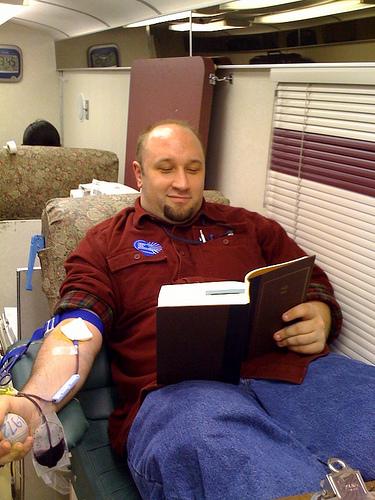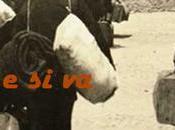
Easy like reading a book ;)
Mentre mi recavo in stazione, l’altro giorno, ho visto un brutto incidente in moto. Quel ragazzo stava perdendo parecchio sangue.
In stazione c’erano almeno un centinaio di persone solo sulle banchine, in attesa dei treni.
“Quante persone doneranno il sangue, secondo te?” ho chiesto al mio ragazzo.
“Non so, forse 50″ mi ha risposto lui.
Il mio ragazzo è un tipo positivo. In media, solo 4 delle persone sulle banchine donano il sangue. I dati dell’Avis sono preoccupanti: 1.600.000 donatori ogni anno, ossia il 2,9% della popolazione totale. Su una popolazione tra i 18 e i 65 anni, solo 42 persone su 1000 donano il sangue*. L’indice di donazione – ossia il numero di donazioni per anno – per il sangue intero è di 1,6 nella nostra nazione, molto al di sotto della media europea. Vi sembra tanto? Non lo è. Ci sono regioni come la Sicilia e la Sardegna che necessitano ogni anno di circa 69 unità di sangue ogni 1000 persone.*
Ogni volta che un vostro caro entra in una sala operatoria anche per una banalità di routine, ha bisogno di sangue. Perché non si sa mai. E se non ci fosse, il sangue per loro?
Ecco perché è importante donare il sangue. Lo possono fare tutti, infatti i requisiti sono davvero “popolari”:
- avere tra i 18 e i 65 anni
- pesare più di 50 kg
- avere il battito cardiaco tra le 50 e le 100 pulsazioni al minuto (gli sportivi possono averlo anche più basso)
- non soffrire di pressione alta o bassa, oltre a non avere malattie particolari e/o infettive
- godere della tradizionale “sana e robusta costituzione“. Cioè essere in salute.
Prima delle operazioni di donazione del sangue, lo staff medico vi farà una breve visita, e vi preleverà un campione di sangue per accertarsi che i vostri valori ematici siano nella norma. E in questo, vi siete guadagnati un’esame del sangue gratis.
Potete donare il sangue in due modalità:
- Sangue intero: vi viene prelevato del sangue. Dopo 15 minuti sarete di nuovo operativi.
- Aferesi: vi viene prelevato solo una specifica componente di cui si abbisogna: piastrine o plasma, per esempio. Il resto del sangue vi viene “restituito”. Dopo 30/40 minuti sarete di nuovo operativi.
Paradossalmente, donare il sangue non ha nessun effetto collaterale. Potreste sentirvi un po’ stanchi, ma donare il sangue stanca meno delle ore di straordinario che fate puntualmente in ufficio.
Per gli sportivi, invece, la situazione è leggermente diversa. Donare il sangue comporta il rispetto di qualche giorno di riposo, per permettere al sangue di “rigenerarsi”. Per l’agonista, donare il sangue significa abbassare il valore di ematrocrito anche del 5%, e quindi avere qualche problema in termini di sforzo/performance.
Ma il sangue dello sportivo è il sangue più ambito, più ricco, più “sano”: fare la donazione in aferesi salva capra e cavoli, perché non presenta perdita di sangue per il soggetto che dona.
Donare il sangue dovrebbe essere un dovere morale di tutti. La nostra società sarebbe meno egoista se tutti, almeno una volta nella vita, donassero il sangue. Ve lo chiedo anche come favore personale: se potete farlo, andate a donare il sangue.
Donare il sangue ti fa sentire meglio.
Donare il sangue è vita.
* dati 2011 del Centro Nazionale Sangue del Ministero della Salute
–
I saw a bad motorcycle accident on my way to the station, a couple of days ago. That guy was losing a lot of blood.
There were at least a hundred people on the docks at the station, waiting for trains.
“How many people donate blood, in your opinion?” I asked my boyfriend.
“I do not know, maybe 50,” he said.
My boyfriend is a positive guy. On average, only 4 people on the docks use to donate blood in Italy. The data items are worrying: according to Avis – the italian association of volunteer blood givers – in Italy there are 1,600,000 givers each year, ie 2.9% of the total population. Among a population between 18 and 65 years old, only 42 people every 1,000 use to give blood*. The index donation – i.e. the number of givers per year – for the whole blood is 1.6 in our nation, a percentage well below the European average.
Does it seems so much? It is not. There are regions such as Sicily and Sardinia which need each year something like 69 units of blood every 1000 people.*
Whenever a loved one enters into an operating room for a banal routine, needs blood. Because you never know. And if there were not blood for your loved ones?
That’s why it is important giving blood. Everyone can do it, in fact the requirements are really “common”:
- Being between 18 and 65 years old
- Weighing over 110 lbs
- Having the heartbeat between 50 and 100 beats per minute (athletes may have even lower)
- Do not suffer from high or low blood pressure, and showing no particular diseases and /or sores
- Enjoying the traditional “sound constitution“. That means basically being healthy.
Before the operations of the blood donation, the medical staff will make a short visit and we will take a blood sample to make sure that your haematic counts are normal. And this means also that you are earning a blood test for free.
You can give blood in two ways:
- Whole blood: blood is drawn there. After 15 minutes you will be operative again.
- Apheresis: they pick up only a specific component needed: platelets, leukocytes or plasma, for example. The rest of the blood will be “returned” to you. After 30/40 minutes you will be operative again.
Paradoxically, giving blood does not have any side effects. You may feel a bit tired, but giving blood is less exhausting than the overtime you usually do at the office.
For athletes, however, the situation is slightly different. Giving blood entails a few days of rest to allow blood to “regenerate”. For the agonists, giving blood means lowering the value of hematocrit (HTC) as much as 5%, and then they could have some problems in terms of effort/performance.
But sportsmen’s blood is the most coveted, richer and more “healthy” one: making an apheresis saves both ways, because there are no blood loss for the person who gives.
Giving blood should be a moral duty for everyone. Our society would be less selfish if everyone gave blood at least once in their life.
Giving blood makes you feel better.
Giving blood is life.
* 2011 data of the National Blood Centre of the Italian Ministry of Health
Photo credit by Rob Dumas
Ti potrebbe interessare anche questo! / Posts you might be interested in
- Eeek! Niente, per ora :)






